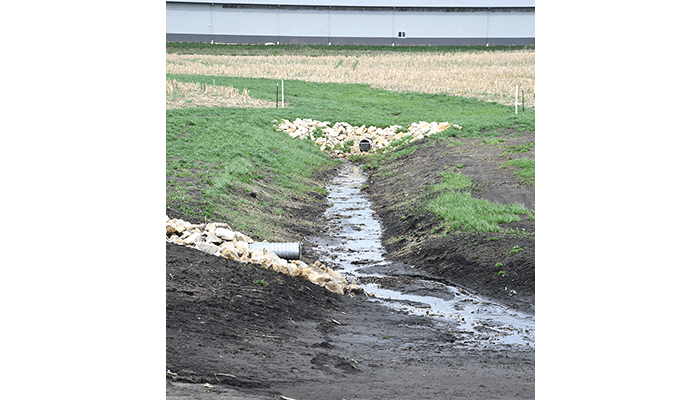DMACC dedicates new wetland on farm
Author
Published
5/1/2023
Des Moines Area Community College (DMACC) dedicated a recently completed 6.3-acre wetland on its farm in Dallas County last month, with the ceremony appropriately taking place between heavy April rainshowers.
The project will have multiple benefits, said Travis Lautner, agribusiness instructor at DMACC who helps manage the farm.
“[This wetland] will do a lot of things such as housing wildlife and filtering water off more than 300 acres of farmland,” he noted.
The project, a collaboration between DMACC, the Iowa Agriculture Water Alliance (IAWA), the Iowa Department of Agriculture and Land Stewardship (IDALS), Dallas County, Polk County utilities and Ducks Unlimited, was completed last November.
Lautner said efforts to build a wetland on the site started in 2019 but were delayed by the 2020 pandemic.
DMACC plans to seed the area with perennial grasses and prairie seed mixes this spring to get the plants established before allowing the retention pond to rise to its final depth of 4 to 5 feet.
DMACC officials said the new wetland is an educational opportunity for the next generation of Iowa farmers and ag business leaders.
The school said the wetland will help reduce the amount of nitrate and other runoff from farm fields in the North Raccoon River Watershed. Students also will study the wetland and learn conservation best practices — such as no-till and cover crop use — that they can take back to their home farms or apply to future careers.
Iowa Secretary of Agriculture Mike Naig was on hand to celebrate the opening of the DMACC wetland, which is leased to the Dallas County Water Conservation District for the next 30 years.
“I can’t think of a better use for this spot than in service of hundreds of acres of farmland,” Naig said.
The DMACC Farm, established in 1999, includes 562 acres of soybeans, corn, pasture and hay ground, as well as cow/calf and swine operations.
Known for years as the Dallas County Poor Farm, the land was originally purchased by the county in the 1800s to house and feed those in need.
Since entering a lease agreement with DMACC more than 20 years ago, the farm has been transformed into a real-world classroom.
“I hope some of you leave here inspired today,” Naig said to visitors to the site. “This is the great challenge of our time. We must accelerate and do even more for water quality and conservation in the future.”
Naig said IDALS, along with more than 350 partners, are working to expand conservation practices across Iowa.
While not every site will work the same, the work to keep Iowa’s water clean and the land secure can be applied throughout the state, Naig said.
“It’s important that landowners and managers know this is not a one-size-fits-all solution,” he said. “We’re tailor-making conservation for each field and each county. Each location is unique.”

Pictured above: Water from a crop field is channeled toward a newly constructed wetland at the Des Moines Area Community College farm in Dallas County. PHOTO / COREY MUNSON
Want more news on this topic? Farm Bureau members may subscribe for a free email news service, featuring the farm and rural topics that interest them most!